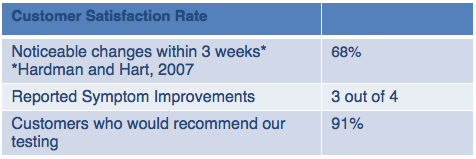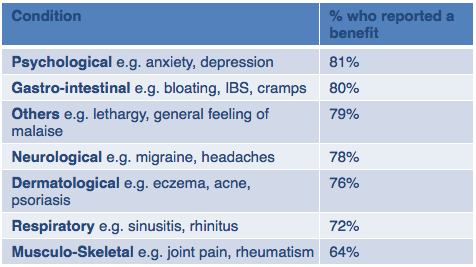The York Test – Food Intolerance Testing
 Controlling food intake is one of the easiest ways to ensure good health and can help with depression, anxiety, IBS, migraine, fibromyalgia and many other symptoms.
Controlling food intake is one of the easiest ways to ensure good health and can help with depression, anxiety, IBS, migraine, fibromyalgia and many other symptoms.
The York Test (Lorisian) is now available in Mansfield, through a simple finger prick blood test, we send the sample to a reputable laboratory where Lorisian (otherwise known as The York Test) can measure food specific IgG antibody reactions to 208 food and drink ingredients – identifying which ones may need to be eliminated from your diet. Interestingly, the foods can eventually be reintroduced after 3 months, unlike an allergic reaction, which tends to be lifelong.
Time taken to feel the benefit of this test is measured in days and 3 out of 4 people report significant benefit within 3 weeks. To book an appointment, click on the link here The cost for the full York Test (Lorisian) of 208 foods and drinks is £149 (February 2021), £174 thereafter.

What is the difference between allergy and intolerance?
The term ‘food intolerance’ and ‘food allergy’ are often confused and are two very different things.
Genuine food allergy is relatively rare. Only about 2% of the adult population are affected. A food allergy is a swift response by the body’s immune system to a specific food. In this type of reaction, the body’s immune system mistakes a food for an ‘invader’ which often results in a rapid allergic reaction often within minutes, but generally within a maximum of two hours. This type of allergic reaction is commonly associated reactions to peanuts, tree nuts, milk, eggs and seafood.
 Food intolerance is quite different to food allergy and whilst the symptoms can impact the person’s quality of life they are not life threatening. Food intolerances are much more common than food allergies.
Food intolerance is quite different to food allergy and whilst the symptoms can impact the person’s quality of life they are not life threatening. Food intolerances are much more common than food allergies.
When foods and drinks are digested the proteins within them are broken down into smaller fragments for easy absorption into the body. Larger fragments can pass through without breaking down, and sometimes the body reacts by attacking them using antibodies called Immunoglobulin G’s (IgG).
A recent study* has shown that those who eliminated trigger foods based on food-specific IgG test results had reductions in weight, body mass index, waist and hip circumference and improvements in all indicators of quality of life that were measured. The quality of life indicators included physical and emotional wellbeing, mental health, social life, pain levels and vitality.
*Lewis J et al, 2012: Eliminating Immunologically-Reactive Foods from the Diet and its Effect on Body Composition and Quality of Life in Overweight Persons. Journal Obesity & Weight loss Therapy 2:1
Allergy vs Intolerance
| Food Intolerance | Food Allergy |
|---|---|
| Reactions up to 72 hours after eating | Immediate reactions (2 hours or less) |
| Multiple foods can be involved | Rarely more than 1 to 2 foods |
| Any organ system can be affected | Primarily skin, airways and digestive system |
| Very common | Trace amounts of foods can cause reactions |
| Difficult to self-diagnose | Caused by raised IgE antibody |
| Symptoms can clear after avoidance (3-6 months) | Lifelong |
Food intolerance† is a condition with a wide range of symptoms including: including gut symptoms, bloating, migraines, low mood, weight gain, fatigue and skin problems.
- Abdominal Pain
- Aches and Pains
- Acne
- Bloating
- Constipation
- Chronic Fatigue Syndrome
- Diarrhoea
- Dizziness
- Eczema
- Fatigue
- Irritable Bowel Syndrome (IBS)
- Itching
- Fluid Retention
- Headaches
- Hyperactivity
- Migraine
- Nausea
- Rashes
- Rhinitis
- Sinusitis
- Stomach Cramps
- Tension
- Tiredness
- Urticaria
- Weight loss/Weight Gain
- Wheezing
Symptoms of food intolerance can take up to 72 hours to appear after eating the trigger food or group of foods. On average people who suffer from food intolerances usually have between 4 and 8 trigger foods.
Many people suffer for years, having formed a coping mechanism to deal with the symptoms but being unable to enjoy a normal work and home life. Many people don’t realise that there are easy steps to take that could resolve their condition.
Using the Lorisian range of tests is another way of extending the service that you provide your customers. Lorisian can help you provide a fast track or starting point for an elimination diet to help your clients’ optimise their health and wellbeing.
What sets Lorisian apart from the competition?
There are no international standards available for tests that measure food-specific IgG antibodies. The only way that a particular food specific IgG test can be shown to be valid is by carrying out clinical trials.
Our food-specific IgG method has had more scientific papers published about its performance than any other food intolerance test on the market.
The studies include two independent randomised controlled trials; including a unique trial in IBS. In addition the largest study of its kind, commissioned by the UK medical charity Allergy UK, with over 5,000 participants, 76% of which reported moderate to high benefit in their chronic ill health symptoms after using the service. This means that we can make claims about test accuracy and effectiveness using substantive evidence; something that other suppliers cannot do; there are many tests and programmes that are offered that do not have any published data available to show how they perform.
False positive results remain the biggest challenge for test providers. We use a proprietary formulation during the ELISA (enzyme linked immunosorbent assay) test manufacturing process in order to block non-specific binding (false positive results).
We can therefore provide the maximum benefit and support for your customers by accurately advising minimal dietary changes.
We have data sets supporting a reproducibility of greater than 98%.
This is achieved by using consistent and controlled manufacturing processes and operating procedures.
Reproducibility performance is supported with regular routine quality control checks and includes ELISA plate to plate checks and sample to sample data. Sample stability claims are also supported.
†Food intolerance symptoms must always be checked out by a Medical Professional. Information and table above provided by Lorisian http://www.lorisian.com/food-intolerance-explained/

